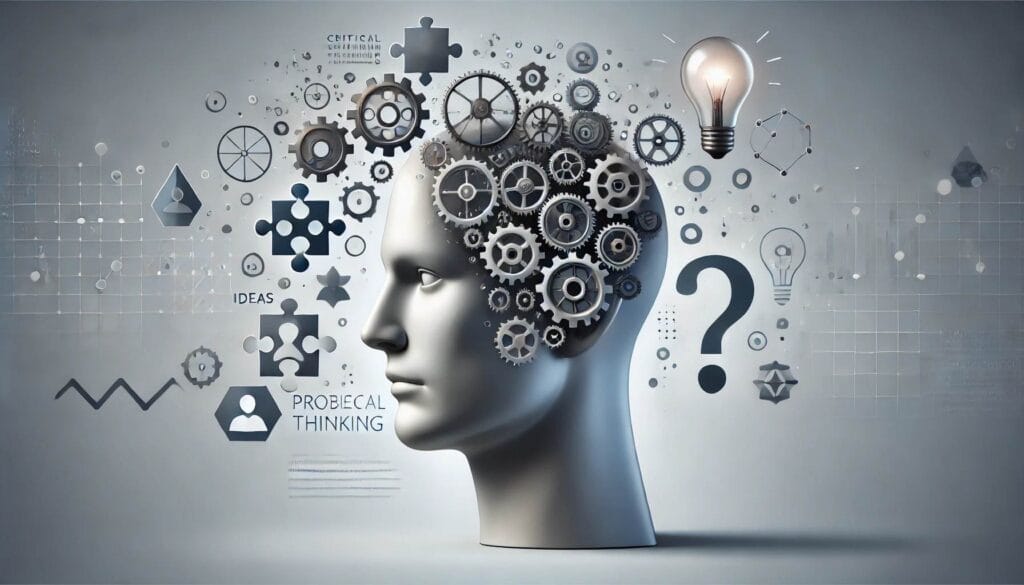Mastering Critical Thinking and Problem Solving: A Guide to Thriving in Any Situation

In today’s fast-paced world, one skill set remains timeless: critical thinking and problem solving. Whether navigating complex work challenges or daily life decisions, these skills empower us to evaluate situations logically, make sound judgments, and find effective solutions. In this post, we’ll dive into what these skills entail and how you can develop them to improve your personal and professional life.
What is Critical Thinking?
Critical thinking is the ability to objectively analyze information, question assumptions, and approach problems with clarity. It’s about going beyond surface-level thinking and looking deeper into how facts and ideas connect. A critical thinker doesn’t just accept things at face value—they examine the evidence, consider different perspectives, and come to well-reasoned conclusions.
Why is Critical Thinking Important?
- Better Decision Making: Instead of reacting impulsively, critical thinking allows you to weigh options carefully before acting.
- Fewer Mistakes: By thoroughly analyzing information, you’re less likely to make errors based on incomplete or misleading data.
- Improved Relationships: It enhances communication by helping you understand and consider other viewpoints.
What is Problem Solving?
Problem solving is the process of identifying, analyzing, and finding solutions to complex issues. It’s the practical application of critical thinking. Effective problem solvers don’t just find any solution; they look for the best solution by considering all possible outcomes, resources, and obstacles.
Steps to Improve Critical Thinking and Problem Solving
1. Ask Questions
Great problem solvers and critical thinkers start by asking the right questions. Don’t take things at face value. Ask yourself:
- What’s the problem or challenge I’m facing?
- What information do I need to fully understand it?
- What are the possible consequences of different actions?
Asking questions helps you gather relevant data and consider different angles.
2. Break Down the Problem
Large problems can be overwhelming, but breaking them into smaller, manageable parts makes them easier to tackle. Use techniques like mind mapping or brainstorming to visually organize the issue and possible solutions.
3. Evaluate Information Objectively
Take time to research and analyze information from various sources. Avoid confirmation bias (only seeking information that supports your beliefs). Challenge your assumptions and be open to other perspectives, even if they seem uncomfortable or counterintuitive.
4. Consider Multiple Solutions
Don’t settle for the first solution that comes to mind. Generate several alternatives, then weigh the pros and cons of each. Ask yourself:
- What resources are required for each solution?
- How long will it take?
- What risks are involved?
This methodical approach ensures you pick the most effective and sustainable solution.
5. Be Open to Feedback
Sometimes, others can see flaws in your thinking that you may overlook. Whether it’s from colleagues, mentors, or friends, constructive feedback helps you refine your critical thinking and improve your problem-solving strategies.
6. Practice Mindfulness
Emotions can cloud judgment, leading to rash decisions. Practicing mindfulness helps you stay calm and focused, allowing you to think more clearly in stressful situations. Simple breathing exercises or taking a short break can work wonders in regaining clarity.
Applying Critical Thinking and Problem Solving in Everyday Life
- Workplace: When faced with a project issue, critical thinking enables you to assess what went wrong and explore ways to fix it. Problem solving helps you implement these solutions efficiently.
- Relationships: In personal interactions, thinking critically about your responses can prevent misunderstandings and improve communication.
- Decision-Making: From choosing investments to planning your day, critical thinking ensures you’re making informed, thought-out decisions that will benefit you in the long run.
Final Thoughts
Mastering critical thinking and problem solving is like building a muscle—the more you practice, the stronger it becomes. By cultivating curiosity, evaluating information objectively, and staying open to new perspectives, you’ll be better equipped to navigate life’s challenges with confidence and clarity.
Start by asking questions, challenging assumptions, and exploring creative solutions, and you’ll soon see how transformative these skills can be in both your personal and professional life.
Source : Medium.com




